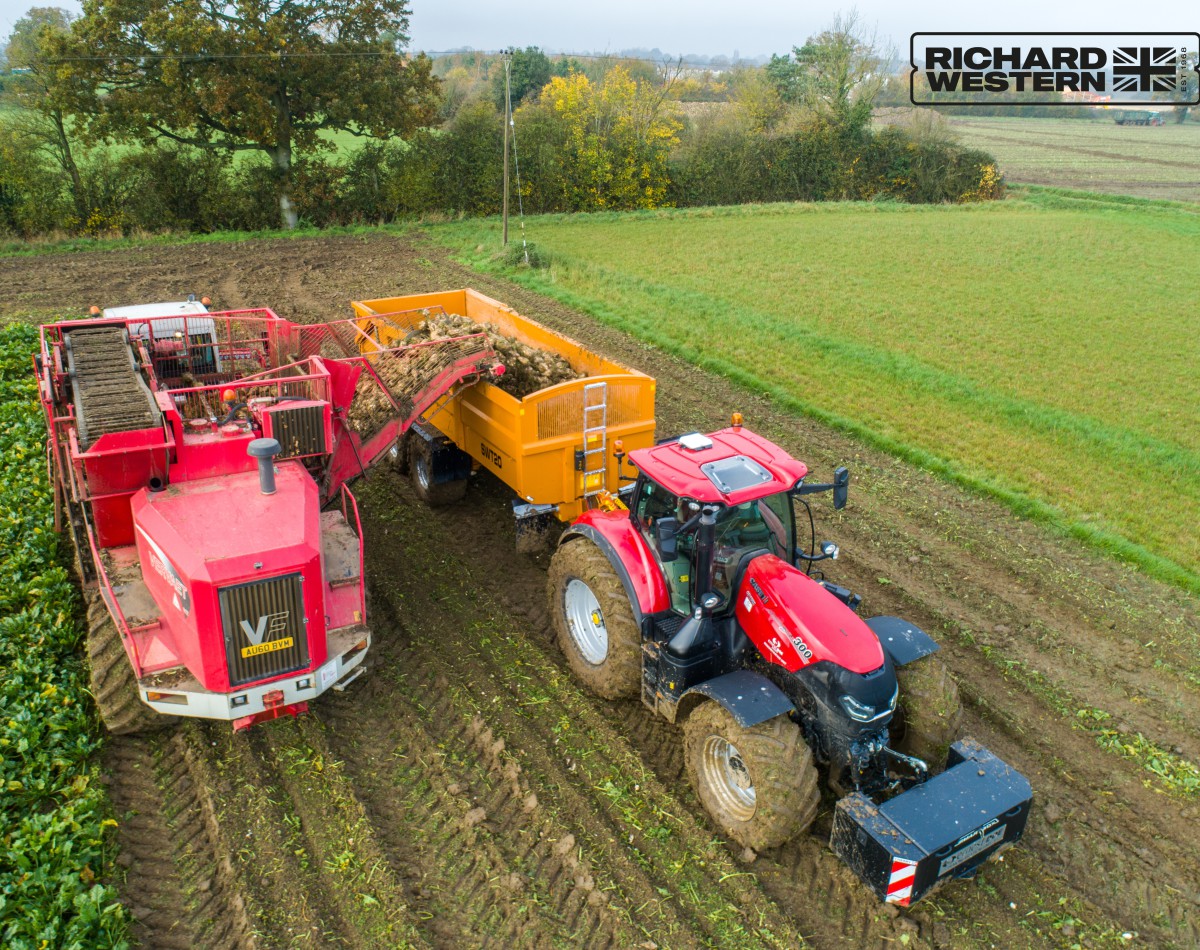Beet harvest and haulage efficiency boosted by high capacity trailer design

Re-thinking and re-engineering an established trailer design specifically for higher-capacity sugar beet haulage has this season enabled a number of beet growers to boost harvest capacity, reduce trailer-load numbers and as a result cut fuel use and field damage.
That has been the result of a demonstration campaign with the prototype flagship model in the new Richard Western Beet Wellington range, which now enters production for next year. With a maximum payload of 20 tonnes – 11 per cent more than an 18-tonne model – the new trailer helps ensure high-output harvesters are not kept waiting to unload, and cuts the number of hauls her field.
“One of the priorities when we designed a trailer with this capacity was the selection of the correct running gear suited to its potential gross weight,” explains Angus Western, managing director of Richard Western.
“That componentry included the right combination of wheels, axles and heavy-duty springs and spring hangers. Commonly-used 560/60 R22.5 tyres are at their maximum capabilities when supporting an 18t load, and in this situation will require 4.0 bar pressure, eliminating any low ground pressure benefits. With a 1,250mm diameter, they will also mean more horsepower is required to tow the trailer.
“By selecting tyres with an increased diameter and reduced operating pressure, we reduce the power required for towing. To enable the trailer to carry this weight while making minimal impact on the land, the wheels are shod with 650/55 R26.5 tyres. With a 1,389mm diameter, they have much greater load capabilities, so can be run at lower pressures in the field.”
Angus points out that increased tyre diameter tends to reduce suspension choice, with most manufacturers choosing to overcome this by modifying a truck trailer suspension.
“However, a longer equaliser reduces the articulation between the axles. Instead, we adopted a design that uses longer springs but keeps the equaliser length standard, and uses premium European-made equipment designed for larger diameter agricultural wheels.
“The larger 150mm square section axle with larger diameter wheel bearings is similar to the axle design used on our single axle muck spreaders. While the initial cost of this standard of running gear may be higher, it results in reduced costs over the life of the trailer. As the cost of hydraulic suspension systems has fallen, it has become worthwhile to consider them in beet trailer design, with the increased stability – and therefore safety – in the beet field.”
Suffolk-based Rattlerow Farms was among the first to trial the trailer when it joined the business around halfway through its 310-acre (124ha) beet campaign, on demo from local dealer Ernest Doe Power. With an increased area of beet this season following a reduction in oilseed rape, there was increased pressure to get crop lifted and heaped for collection and delivery to the factory.
“Given how wet it had been during the autumn, we didn’t want more beet acreage to mean more soil damage,” says Rattlerow’s Martin Serjent.
“We run a fleet of mostly 18 tonne trailers for carting our beet, which is lifted by contractor and tipped sometimes onto pads and occasionally into rows for a self-propelled cleaner-loader.
“Keeping up with both the harvester and the cleaning/loading operation is important, and we want to get crop off the land with the minimum of machinery movement and soil damage, so we were interested in trying out the new higher-capacity trailer.
“The idea of bigger 26in rims in place of the 22.5in units on our 18-tonne trailers was appealing, as they put a longer tyre footprint on the ground to bear the load. The trailer arrived on a 300hp Case IH Optum 300, but over the two days it was with us we tried it with our 240hp Fendt 724, and that handled it well. The better rolling circumference of the larger wheel/tyre combination, and the trailer suspension, definitely make a difference to ease of pulling and to reducing the impact on the soil, while general build quality and strength appear to be very good.
“We begin lifting beet as soon as Bury St Edmunds factory opens, and aim to be finished by Christmas if possible. With the way the weather has been in the early part of the season, extra capacity, taking two tonnes more in every trailer load, is very welcome – as is that bigger tyre footprint and reduced ground compaction.”

Find your nearest dealer
From our international network
